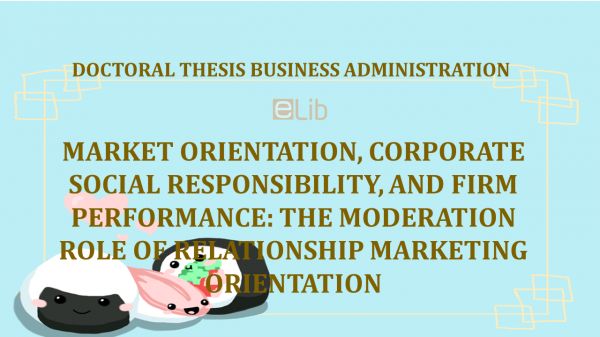Th.D: Market orientation, corporate social responsibility, and firm performance: The moderation role of relationship marketing orientation
The thesis Market orientation, corporate social responsibility, and firm performance: The moderation role of relationship marketing orientation is completed with the objectives the study tries to investigate the relationship among concepts such as CSR, MO and firm performance with the moderating role of RMO.

1. Overview of research
1.1 Motivation
In transitional economy as Vietnam, business activities of the firm are affected by the constant changes in knowledge, the limitation in resources, the tough competitions and unpredicted risks, etc. In such context, the role of key person insider of the firm such as employees, CEO, senior managers become very important. They should have more extensive experiences in equipping market information, knowledge in order to improve or maintain firm performance (Wiklund, 1999). Besides, they also have enriched the business relations as well (Nguyen & Viet, 2012). With a collectivist culture, Vietnam has a highe level in term of relation orientation towards the others. Hence, in Vietnam, the value congruence towards customers is more likelihood in such a collectivistic culture (Luu, 2017). Lumpkin & Dess (1996) demonstrate that both inside and outside factors always have an impact on firm performance. Moreover, they also point that any changes in characteristics would change the nature of the firm as well as its operations.
1.2 Research objectives
The CSR concept is quite new and not popular relevant studies for Vietnamese firms are published
There have many studies about RMO concept but a few of them is linked to the CSR and MO concepts together with firm performance
The examination about the relationship of these concepts in context of Vietnam marketing communications firm has not much been concerned by local scholars.
1.3 Research scope
- Research respondents: senior managers and directors; business owners or shareholders of Vietnam marketing communications firms.
- Research scope: Vietnam marketing communications firms with 100% owned by Vietnamese citizens that have headquarters or branches mainly operating in Ho Chi Minh City.
1.4 Research methods
The study is conducted into two phases: the pilot study and the main survey incorporating with the mix-method as,
- In the first phase, basing on theory of the firm, the stakeholder theory, the RMO theory, the CSR theory
- The second phase, the quantitative is undertaken to examine the scale of factors belonging to CSR, MO and RMO concepts
2. Content
2.1 Introduction
Motivation
Research objectives
Research questions
Research scope
Research methods
Research contributions
2.2 Theoritical background and hypotheses development
Overview theory of the firm
The stewardship theory
The agency theory
The stakeholder theory
Relationship marketing theory
Market orientation
Corporate Social Responsibility - CSR
Firm performance
Market orientation and CSR
2.3 Methods and measurement
Introduction
Research design
Measurement
2.4 Data Analysis and research results
Introduction
Overview and research sample description
Measuring scales before analyzing EFA
Cronbach's alpha for CSR components
Cronbach’s alpha for MO components
Cronbach’s alpha for RMO components
Cronbach’s alpha for FP components
Exploratory Factor Analysis - EFA
2.5 Discussion, implications and conclusion
Introduction
Research results summary
Research contributions
Managerial implications
Research limitations and further research directions
3. Conclusions
Research results also show the correlation in relationship when MO concept is the important premise towards CSR activities. Then, they ultimately affect to the firm performance. This is also consistent with previous studies such as Maignan et al. (1999) when conducting the experiment study in US firms, or Qu (2009) in China market, and Long (2015) in the Mekong Delta, Vietnam. Thus, it can be said that enterprises which have clearly market orientation, it would has positive impact on CSR activities. Since then, CSR has positive impact on firm performance (Luo & Bhattacharya, 2006; Qu, 2009; Luu, 2017). The participation of RMO as moderation variable towards the relationships among MO, CSR, FP concepts is demonstrated in this study. Therefore, beside firm has good market-oriented and effective CSR activities to achieve the desired performances, the implementation of the relationship marketing activities are also necessary. Regarding to six component variables of RMO, the research results show that most of components participates in such a moderation role to all relationships in research model. Again, in practice, local firms should pay much attention to all of these six components.
4. References
4.1 Vietnamese
Nguyen, D. T., & Barrett, N. J. (2006). The role of market orientation and learning orientation in quality relationship: The case of Vietnam exporting firms and their customers. International Marketing Journal, 14 (2), 116-47.
Nguyen, D. T., & Nguyen, T. M. T. (2008). Study for dynamic capabilities of Vietnamese firms in Ho Chi Minh City (Independent research, code B2007-09-46- TD). Vietnam: University of Economics – Ho Chi Minh City.
Nguyen, T. D., & Nguyen, T. T. (2011). The WTO, marketing and innovativeness capabilities of Vietnamese firms. Management Research Review, 34(6), 712-726.
Nguyen Hau, L., & Viet Ngo, L. (2012). Relationship marketing in Vietnam: An empirical study. Asia Pacific Journal of Marketing and Logistics, 24(2), 222-235.
Trong Tuan, L. (2014). Clinical governance, corporate social responsibility, health service quality, and brand equity. Clinical Governance: An International Journal, 19(3), 215-234.
4.2 English
Aupperle K., Carroll A., Hatfield J. (1985). An empirical examination of the relationship between corporate social responsibility and profitability. Academy of Management Journal, 28, 446-463.
Austin, J. E. (2010). The collaboration challenge: How nonprofits and businesses succeed through strategic alliances (Vol. 109). John Wiley & Sons.
Bai, C. E., Lu, J., & Tao, Z. (2006). The multitask theory of state enterprise reform: empirical evidence from China. American Economic Review, 96(2), 353-357.
Baker, W. E., & Sinkula, J. M. (1999). The synergistic effect of market orientation and learning orientation on organizational performance. Journal of the academy of marketing science, 27(4), 411-427.
Callaghan, M., McPhail, J. and Yau, O.H.M. (1995), “Dimensions of a relationship marketing orientation: an empirical exposition”, Proceedings of the Seventh Biannual World Marketing Congress, Melbourne, Australia, pp. 10-65.
--- Nhấn nút TẢI VỀ hoặc XEM ONLINE để tham khảo đầy đủ nội dung Luận án tiến sĩ Quản trị kinh doanh trên trên ---
Tham khảo thêm
- pdf Luận án TS: Trách nhiệm xã hội của doanh nghiệp, chất lượng mối quan hệ thương hiệu – khách hàng và ý định chuyển đổi thương hiệu trong thị trường hàng tiêu dùng ở Việt Nam
- pdf Luận án TS: Nghiên cứu hoạt động mua lại cổ phiếu tại các công ty trong ngành công nghiệp niêm yết trên thị trường chứng khoán Việt Nam
- pdf Luận án TS: Nghiên cứu các nhân tố ảnh hưởng đến việc triển khai giải pháp quản trị quan hệ khách hàng điện tử tại Hãng Hàng không Quốc gia Việt Nam
- pdf Luận án TS: Mạng lưới quan hệ, đổi mới mô hình kinh doanh và kết quả hoạt động của doanh nghiệp khởi nghiệp tại Việt Nam
- pdf Luận án TS: Hoàn thiện môi trường kinh doanh cho các doanh nghiệp du lịch Việt Nam trong tiến trình toàn cầu hóa
- pdf Luận án TS: Ảnh hưởng trách nhiệm xã hội và sự gắn bó nhân viên đến kết quả hoạt động doanh nghiệp – Nghiên cứu trường hợp các doanh nghiệp phía Nam
- pdf Th.D: The organizational diagnosis model - The case of local government organizations in Ho Chi Minh city, Vietnam



